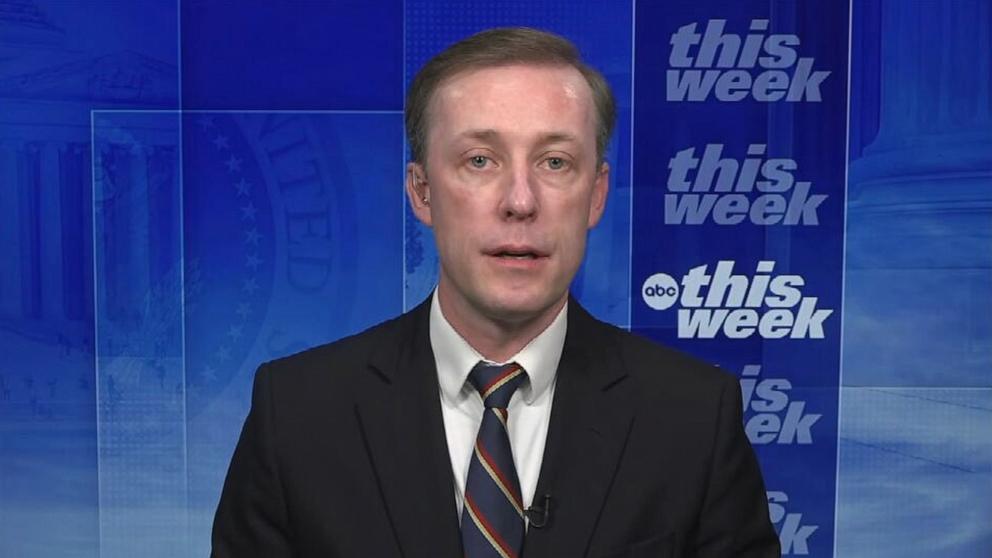Biden team wants to finish strong on Ukraine, Gaza

National Security Adviser Jake Sullivan said Sunday that President Joe Biden is looking to make as much progress as possible on foreign policy before he leaves office next month.
In an interview with "This Week" co-anchor Jonathan Karl, Sullivan said that Biden is hoping to surge aid to Ukraine and move forward with ceasefire talks between Israel and Hamas with his time left in office. Both conflicts have dogged the administration, with Ukraine struggling to retake territory it lost to Russia and little progress in Gaza despite a ceasefire between Israel and Hezbollah in Lebanon.
"We are going to do everything in our power for these 50 days to get Ukraine all the tools we possibly can to strengthen their position on the battlefield so that they'll be stronger at the negotiating table. And President Biden directed me to oversee a massive surge in the military equipment that we are delivering to Ukraine so that we have spent every dollar that Congress has appropriated to us by the time that President Biden leaves office," Sullivan said.
When pressed on clinching a deal in Gaza and possibly broader diplomatic breakthroughs between Israel and Arab countries like Saudi Arabia, Sullivan said, "The first step is getting the ceasefire and hostage deal. If we can get that into effect, then the possibilities for a broader diplomatic initiative in the region along the lines that you just described really open up, and we will use every day we have in office to try to generate as much progress towards that end as possible."
Making progress on both fronts remains a tall order for multiple reasons. The U.S. has vowed to not make any decisions about Ukraine without Kyiv's input and the Israeli government has appeared reluctant to wind down fighting in Gaza.
And with President-elect Donald Trump entering office, foreign policy priorities will undoubtedly be shaken up. Trump is believed to be unlikely to pressure Israel to scale back its military operations in Gaza, and he has appeared skeptical of sending aid to Ukraine at the same pace the Biden administration has.
"I've encouraged the Ukrainian team to engage the incoming team as well as to engage all of our allies and partners, because, again, on Jan. 21, the war in Ukraine doesn't just go away. Obviously, the new team will have its own policy, its own approach, and I can't speak to that, but what I can do is make sure that we put Ukraine in the best possible position when we hand off the baton," Sullivan said, referencing the day after Trump takes office.
Still, Sullivan debunked a report suggesting that the administration is open to returning nuclear weapons to Ukraine.
"That is not under consideration. No. What we are doing is surging various conventional capacities to Ukraine so that they can effectively defend themselves and take the fight to the Russians, not nuclear capability," he told Karl.
Sullivan did say, however, that the transition is going smoothly.
"We got a lot of work to do, and frankly, we're going to try to do that also in a way where we have a smooth transition with the incoming Trump team. And I have to say that I've been gratified so far by the coordination I've been able to have with the incoming Trump team. They seem focused also on a smooth transition, because they want to be able to hit the ground running," he told Karl.
After Trump takes office, however, things become less clear.
Trump on Saturday tapped Kash Patel, a loyalist and vocal critic of the Justice Department, as his pick to lead the FBI. Patel has railed against the so-called "Deep State," naming Sullivan as a member.
When pressed on if that pick concerns him, Sullivan dodged.
"I'm not going to speak to President-elect Trump's nominees. I'll let him and his transition team speak to that," Sullivan said.
"We inherited an FBI director who actually had been appointed by President Trump, Director Chris Wray, who has continued to serve in that role through the four years of the Biden administration, and served with distinction, served entirely insulated from politics where the partisan preferences of the current sitting president of the United States. This is a good, deep, bipartisan tradition that President Biden adhered to."







